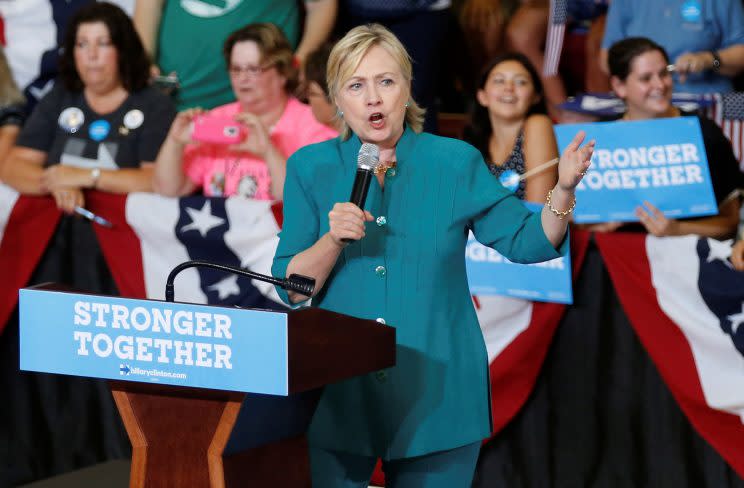Pollsters say ‘Walmart moms,’ wary of Trump and Clinton, are critical vote in 2016

Previous elections have given us “the silent majority,” “Reagan Democrats” and “NASCAR dads.” But pundits and pollsters have identified a new group to watch, and it is one you might not expect: “Walmart moms.”
Political strategists are increasingly thinking about these voters, who make up an estimated 14 to 17 percent of the electorate in the 2016 presidential race. “Walmart moms” are defined by pollsters as the sort of voters who have children under the age of 18 and a household income hovering around the nationwide average.
Democratic pollster Celinda Lake told Yahoo News that these parents are less concerned with the back and forth of the presidential race than the hard details about how candidates could help them support their family, keep their children safe and keep the prices of household staples low.
A “Walmart mom” is “still struggling in the economy, she feels the political system failed her and believes the economic system caters to the well-off,” Lake said. “She is threatened by terrorism and [her] own economic insecurity. Even more so, they are worried they can’t offer a better life to their children.”
To track the opinions of this burgeoning group, two polling firms, Republican-leaning Public Opinion Strategies and Democratic-leaning Momentum Analysis, conducted periodic focus groups with the mothers. The groups, which have been run since 2010, are commissioned by Walmart but have found a broader use in understanding the group’s political orientation.
The focus groups have found that the 2016 election has caused concern among these voters, with the women particularly apprehensive about both Republican nominee Donald Trump and Democratic nominee Hillary Clinton.
A new focus group conducted this week provided further evidence of the dissatisfaction that these voters are feeling in their own lives and toward the political arena. The panel was conducted with two dozen “Walmart moms” in Columbus, Ohio, and Phoenix, Ariz., and remotely observed by a group of journalists and pollsters, including Yahoo News.
“No matter which way you choose, we’re going to lose,” Gidget, a customer service manager from Columbus, said in the group. “You have to give up something. But no one is talking about the issues. … I feel like [the candidates] are so far extreme on both sides, we’re going to have to give up something either way.”
Clinton is viewed as untrustworthy and lacking warmth, with one woman calling her a “stone-cold b****” for her demeanor in the face of controversy.
“I think they are all liars, but I feel like she gets caught a lot,” Julie, a Columbus office worker, said. The overwhelming majority pegged the scandals surrounding Clinton, especially her use of a private email server while secretary of state, as their biggest reservation about her candidacy.
But despite this discontent, the women viewed a potential Trump presidency with even more scorn. While there is some appeal in the business mogul’s financial experience and outsider credentials, most are shocked by his “big mouth” and volcanic temperament.
“He acts like a 2-year-old,” Deanna, a Phoenix mother of four, said. “I have a 2-year-old. I see the similarities.”

Lake said this sentiment fits with the women’s roles as leaders in their households.
“Women want respect, they are the disciplinarians in their homes,” she said. “They hold things together in tough times. They don’t let their families behave like Donald Trump, and they don’t get to behave like Donald Trump.”
While some of the women said they would vote for Trump in the hope that he would tone down some of his rhetoric, others called him “risky” and “dangerous.” Other women, who made up a slight majority of focus group members, said they would reluctantly vote for Clinton or Libertarian Gary Johnson.
Many voters described being fearful about the fate of the country, however, a sentiment that has existed since the primaries.
In an April focus group of suburban mothers from Pittsburgh and Philadelphia, “Walmart moms” continually expressed a lack of enthusiasm for any of the candidates, according to the pollsters running the group. They were nervous about what the future had in store and put off by the “circus” atmosphere of the primary season.
“Using words like ‘chaos,’ ‘horrific,’ ‘terrible’ and ‘vulnerable,’ these women are overwhelmingly pessimistic about the direction of the country,” the analysis of the April focus group read. “This time, however, the Presidential campaign’s tone is almost as worrying as the economy or their own financial situations.”
But how did this subgroup become such an important target for political campaigns? Lake said the group has become much more pliable in the past 20 years as the women have taken on a different societal role.
“Married women didn’t used to be a swing [demographic],” Lake said. “They used to just vote like their husbands. But over time they have gotten more and more independent.”
Lake noted that the gap between how women and their spouses vote has been growing, and that we could see a record discrepancy in November.
President Obama won “Walmart moms” in 2008 and 2012, according to polling conducted after the elections. Then, the key issues for these women revolved around the Great Recession, putting food on the table and national security, according to focus groups conducted at the time. Anger was widespread among these women about how America’s economic recovery did not reach their families.
“These women are frustrated,” Neil Newhouse of Public Opinion Strategies said in 2011. “They see Wall Street getting bailed out. There’s a resentment there that they see a government activism that doesn’t impact them directly. They want their share.”
But despite frustration at the slow recovery from the Great Recession, the “Walmart moms” were not wholly pessimistic — they trusted the candidates to lead them back.
“These voters don’t seem like they have given up on Obama,” Newhouse said after a focus group conducted shortly before the 2012 election. “They are losing patience with Washington, but it seemed like Obama doesn’t come out that bad.”
The women followed through, narrowly supporting Obama in his victory over Republican Mitt Romney. An election night poll conducted by Public Opinion Strategies and Momentum Analysis showed Obama pulled 50 percent of the “Walmart moms” surveyed, compared with 48 percent for Romney. This narrow edge played a part in Obama’s reelection.
“As we talked with Walmart moms around the country this year, we heard loud and clear from them that they were torn over their vote decision,” Alex Bratty and Margie Omero wrote in an analysis of the 2012 poll. “They didn’t always blame Obama for the current economic crisis, but they felt very acutely that recovery was not reaching them quickly enough. And, while they thought Governor Romney might be better on the economy, they also had reservations about switching course. … These election night results demonstrate how tight the race was and how women, and these Walmart moms, helped determine Obama’s victory.”
How can Trump or Clinton better orient themselves to the group to copy Obama’s success? Women were more positive when they felt they were getting a personal view of the candidates. Despite not placing much weight on either convention, focus group members cited speeches from both nominees’ children as moments that affected their views in a positive manner.

“One thing that is important is that the personal is political for these women,” Lake said. “They know the candidates well but also don’t. For Clinton, they may see her as a mother or grandmother but don’t know much about her in those roles. Finding out more about that goes a long way toward making her more likable and trustworthy.”
Even though chaos has reigned during the unconventional 2016 election season, “Walmart moms” are still one of the most critical swing demographics, according to Lake and other pollsters. However, there was pessimism in the focus group as to whether the election would ultimately improve their lives.
“My biggest issue is what is going on in my city and my community,” Dana, a food service worker from Columbus, said. “I obviously would like a candidate who is qualified to take us in the right direction. But honestly, that isn’t going to matter on the home front for me.”
Another participant put it more succinctly: “My opinion doesn’t matter.”

